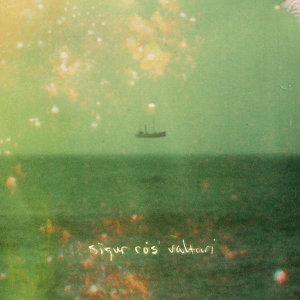The first track, ‘Ég anda’ (‘I Breathe’) is a sound painting of subtle textures – breath, softly sung vocals, whispering strings – which late in the piece plunges into a subterranean world of deep bass tones and faint, fuzzed-out guitar. This segues smoothly into ‘Ekki Múkk’ (‘Not a Sound’), constructed around Jónsi’s familiar, fragile falsetto and quavering strings, with piano adding depth to the mix; a rich swirl of emotionally laden sonic textures; sorrowful and sombre yet somehow hopeful and light, that eventually subsides into solemnity and stillness.
‘Varúð’ (‘Caution’) is a haunting, shivering track of great beauty on which the restraint of Valtari is truly revealed – the crashing surge of drums familiar from previous Sigur Rós albums such as Ágætis byrjun and ( ) builds in the mix but never dominates; instead, Orri Páll Dýrason’s vibrant percussion intertwines with shimmering guitars and a quicksilver choir of high, ethereal voices to spectacular, startling effect.
‘Rembihnútur’ (‘Tightly Knotted’) recalls earlier Sigur Rós collaborations with fellow Iceland group Amiina, and showcases Kjartan ‘Kjarri’ Sveinsson’s subdued, music-box inspired keyboards (or is it Georg ‘Goggi’ Hólm’s glockenspiel and toy piano? In either case it’s a complex layering of sounds). A massed choir opens ‘Dauðalogn’ (‘Calm Death’), perhaps the album’s most mournful track; a contemplative, plaintive fugue.
‘Varðeldur’ (‘Campire’) continues the sweetly melancholy tone; it’s ambient and otherworldly, subtle and fragile; an ethereal sonic mist. Title track ‘Valtari’ (‘Roller’) and the album closer, ‘Fjögur píanó’ (‘Four Pianos’) are equally ambient and enigmatic, but no less beautiful; the former a stately blend of strings and soft chimes, the latter, as its name suggests, a quietly confident keyboard sarabande.
Valtari is the sound of a highly successful band looking inwards to identify what it is that makes them unique and emphasising what they found. Instead of post-rock bombast and drama, they have focused on silence and stillness, subtlety and meditative calm. It’s a risky move given their ever-widening appeal – some listeners will be deterred by the album’s lack of immediacy, while the band’s detractors will dismiss it as ephemeral and dull. Fans and afficiandos, however, will greet it as a confidently crafted, perfectly controlled example of what Sigur Rós do best.
Rating: 4 stars out of 5
Sigur Rós – Valtari
Out now through EMI





